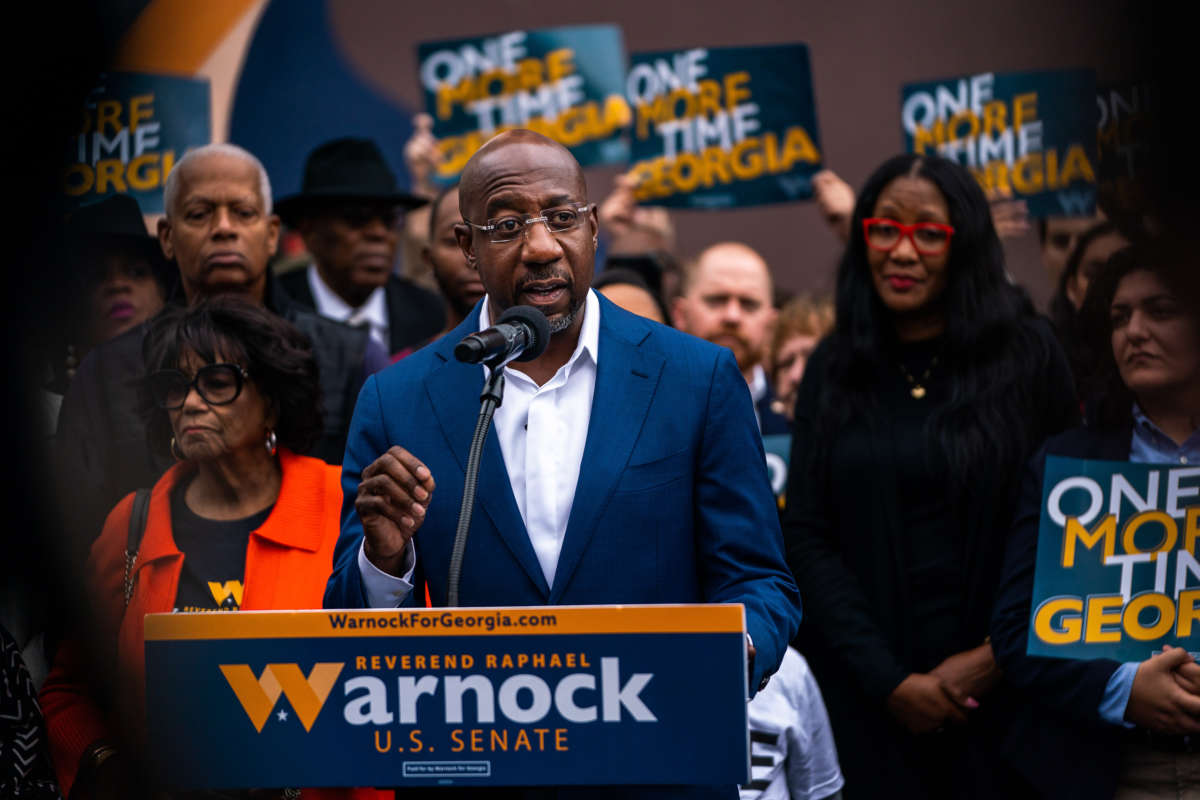Democratic Sen. Raphael Warnock’s campaign has filed a lawsuit against Georgia over Republican officials’ decision this week to bar early voting on Saturdays for the upcoming runoff election, slamming officials for their allegedly “cherry-pick[ed]” interpretation of state voting laws.
Over the weekend, Republican Secretary of State Brad Raffensperger’s office sent out a memo saying that, due to a combination of restrictive voting laws put in place by Republicans in recent years, voters will not be given the opportunity to cast a ballot on the only eligible Saturday, November 26, for the early voting window because of its proximity to a holiday. In this case, the holidays would be Thanksgiving on the Thursday before and a Confederate holiday commemorating Robert E. Lee on Friday that the state has dubbed “State Holiday.”
However, voting rights advocates and Democrats say that this interpretation of the law is false. In the lawsuit, which was joined by the Democratic Party of Georgia and the Democratic Senatorial Campaign Committee, attorneys filing on behalf of the Democrats argue that Raffensperger “misreads” and “cherry-picks” provisions of laws to apply them to the runoff election, when in reality they apply only to general or primary elections.
“Despite the law’s command that counties begin offering advance voting ‘as soon as possible,’ Secretary of State Brad Raffensperger has taken the unsupportable position that counties are barred from opening the polls on Saturday, November 26,” the lawsuit reads. The attorneys point out that Raffensperger had previously said that voters would likely have a chance to vote on that Saturday.
The plaintiffs seek to ensure that counties are not precluded from offering early voting on that Saturday.
The Republicans’ argument for the restriction on Saturday voting comes from a 2016 law that supposedly bars early voting on a Saturday following a state holiday. This supposedly wasn’t a problem in the 2020 cycle’s runoff election for both U.S. Senate seats for the state, as those took place nine weeks after the general election.
However, due to a voter suppression law passed last year by the Republican-dominated general assembly, runoff elections now take place four weeks after Election Day, with the early voting window coinciding with Thanksgiving and the state holiday.
But state officials haven’t followed the 2016 law in this way in the past, one voting rights expert found.
“During the 2020/21 GA Senate runoff, multiple GA counties offered early voting on the Saturday following a holiday (Christmas Day); and the same statutory language that [Raffensperger] relies on now was in place back then,” election law expert Marc Elias pointed out on Twitter on Tuesday. “What changed?” Elias is the founder of voting rights group Democracy Docket and a partner in the Elias Law Group, which helped file the lawsuit.
Voting and civil rights groups have also taken issue with Raffensperger’s interpretation, especially frustrated by the symbolism of colonialist and Confederate holidays barring people from voting.
On Tuesday, the Legal Defense Fund, the American Civil Liberties Union of Georgia and the Southern Poverty Law Center sent a letter to election supervisors in all 159 counties in the state urging them to add at least three additional early voting days on top of and before the currently scheduled five days of early voting, including on Sunday, November 27 and the two days immediately preceding Thanksgiving.
“Georgia law affords you broad discretion to add additional days for advance voting,” the groups write, citing a law that says that early voting should begin “[a]s soon as possible prior to a runoff,” within certain parameters, which they say grants officials the right to offer additional days of voting.
“If you only offer advance voting on the five days required by statute (which, as noted above, is limited to weekdays), there is a significant risk that many voters will be unable to participate due to obligations during the workday,” the letter reads. “Moreover, any voters who are able to vote during the workday are at risk of facing extremely long lines given the limited options that are available.”
The runoff election could be crucial for the Democratic Party. If Warnock wins, it would expand Democrats’ razor-thin majority in the Senate from 50 seats to 51 seats, meaning that the party could potentially work around conservatives in the party like Senators Joe Manchin (West Virginia) and Kyrsten Sinema (Arizona). It would also give the party breathing room in case there are absences or vacancies within the party.
Join us in defending the truth before it’s too late
The future of independent journalism is uncertain, and the consequences of losing it are too grave to ignore. To ensure Truthout remains safe, strong, and free, we need to raise $43,000 in the next 6 days. Every dollar raised goes directly toward the costs of producing news you can trust.
Please give what you can — because by supporting us with a tax-deductible donation, you’re not just preserving a source of news, you’re helping to safeguard what’s left of our democracy.
